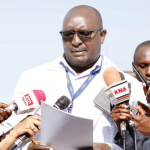Lawmakers were taken aback yesterday to learn that the Ministry of Mining, Blue Economy, and Maritime Affairs had spent Sh1.6 billion on “counting fish” in Kenya’s Indian Ocean zone for the 2023/2024 financial year. The Committee on Blue Economy, chaired by Marakwet East MP Kangogo Bowen, was also informed that the ministry had budgeted a total of Sh3.6 billion for this task and is seeking an additional Sh600 million for the 2024/2025 financial year.
During a meeting with Cabinet Secretary Hassan Joho and Principal Secretary Betsy Muthoni Njagi, lawmakers questioned whether there was value for money in the “marine fish stock assessment” and why the ministry could allocate Sh3.6 billion for fish counting while only raising Sh50 million in revenue.
The stock assessment, which began on July 1, 2023, is expected to be completed in the 2025/2026 financial year. It will be carried out in three phases, each costing Sh1.2 billion. Bowen, leading the committee, demanded to know the results of the assessment and whether it provided value for money, specifically asking for details on the number of fish in Kenyan waters.
Bowen said, “Out of that assessment, what was the end product? Do you have anything to give us? We gave you about Sh1.2 billion to do some stock assessment in the first year. At this point, you should be telling us and telling the country that we have this number of tuna fish, this number of tilapia, etc. We gave you the money so we can know what we have in our waters.”
William Kamket (Tiaty) questioned the allocation, asking, “So you are telling this committee that you were allocated billions just to count fish in the ocean?”
Eric Wamumbi (Mathira) demanded that the Cabinet Secretary present the latest figures from the first phase of the assessment, reflecting concerns about the efficacy of the expenditure amid ongoing austerity measures.
He said: “I am the MP for Mathira and if you ask me how many registered voters are in Mathira, I do not need to research. I know because IEBC did its work… [The CS] is the person in charge of that assessment. He should give us figures on the report of the last assessment. He does not need to prepare.”
Roza Buyu (Kisumu West) questioned why the ministry is budgeting an additional Sh600 million if the project was already completed, having consumed Sh1.6 billion. She asked, “You are talking of some projects not being completed because of austerity measures in the country, yet for this one you have Sh600 million allocated to it. What is the secret behind it?”
Their comments followed a clarification from Joho and his team that the stock assessment had been completed and a report would be presented detailing the progress made so far. Joho emphasized that stock assessment is a global practice, essential for countries involved in the blue economy as it informs licensing regimes and helps governments provide accurate data to investors.
He said: “The assessment really goes beyond counting fish. It involves understanding the entire ecosystem so we can understand the zoning in the ocean. The three-year period allows us to continuously monitor them because they migrate and move and have areas of breeding.”
Regarding the additional Sh600 million, senior chief finance officer Michael Wamwea explained that it was needed to cover phase two of the first year, which includes monitoring during the remaining monsoon seasons. Joho added, “There is a phase two of the two remaining monsoon seasons. That is why the Sh600 million is required.”



